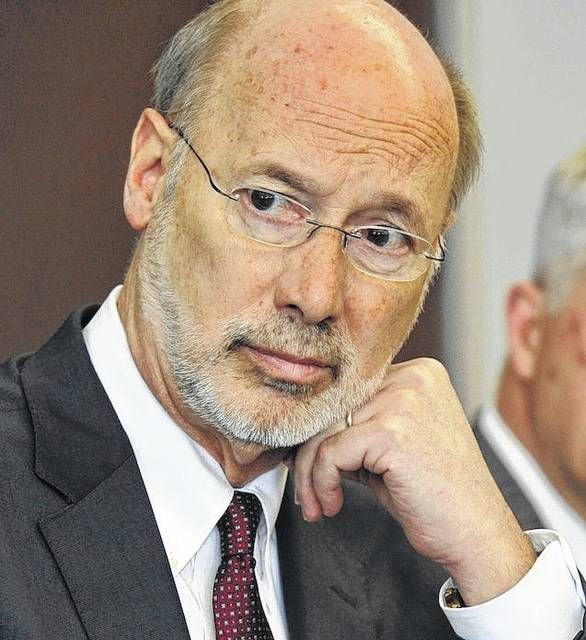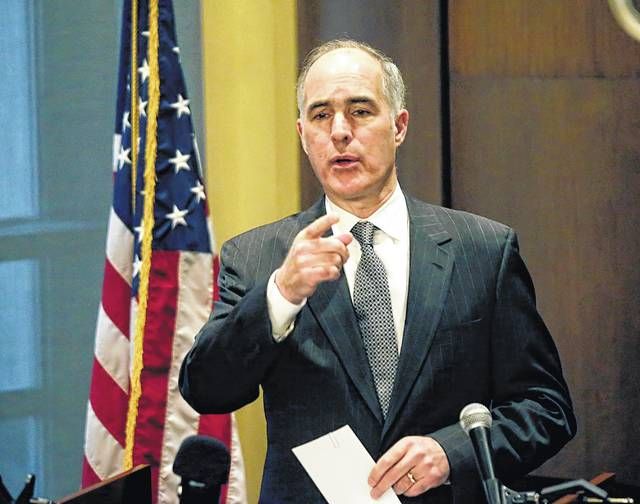Click here to subscribe today or Login.
WILKES-BARRE — U.S. Sen. Bob Casey is calling on Wells Fargo to use its huge windfall from the recently passed GOP tax bill to rehire laid off workers and reinvest in American call centers.
In a letter to Wells Fargo CEO Timothy Sloan, Casey calls on the company to rehire American call-center workers that the company laid off after ramping up its operations in the Philippines.
In recent months, Wells Fargo announced layoffs at call centers in Bethlehem, (eliminating 460 jobs), Fort Mill, S.C., (eliminating 120 jobs), and Vancouver, Wash., (eliminating 72 jobs).
Meanwhile, Casey said Wells Fargo is one of the biggest beneficiaries of the Republican tax bill passed in December, standing to save $3.7 billion next year alone according to one estimate. Citing this windfall, the letter from Casey, D-Scranton, calls on the company to “reverse course and bring these jobs back to Pennsylvania and America.”
In the Philippines, Casey said the Wells Fargo presence in the country has grown from fewer than 100 call center employees in 2011 to more than 4,000 employees today, with plans to expand into a new facility in the Philippines that will house more than 7,000 workers servicing the American marketplace.
During a Senate Banking Committee hearing held earlier this fall, Wells Fargo CEO Sloan admitted during questioning from Sen. Joe Donnelly, D-Ind, that recent rounds of American call center layoffs were directly related to the company’s increased hiring in the Philippines.
While Wells Fargo announced it would boost some of its workers’ base pay as a result of its windfall from the corporate tax cut legislation, Casey said Republican leaders also promised that the bill would also reverse the flow of jobs going overseas.
“If Wells Fargo were serious about fulfilling its obligations to American workers, it would rehire the American call center workers it laid off and put an end to the company’s practice of off-shoring American jobs to the Philippines,” Casey said in a news release.
According to Casey’s office, the U.S. Call Center Worker and Consumer Protection Act, introduced in both the U.S. House and Senate, would require that U.S. callers be told the location of the call center to which they are speaking; would offer callers the opportunity to be connected to a U.S.-based center if preferred; and would make U.S. companies that off-shore their call center jobs from the U.S. ineligible for certain federal grants and taxpayer-funded loans.
Study shows support for
family, medical leave fund
The Pennsylvania Department of Labor and Industry this week released the “Paid Family and Medical Leave in Pennsylvania: Research Findings Report” that was made possible by a 2016 federal grant.
The $250,000 grant funded the work to research and analyze the potential impact of creating a statewide paid family and medical leave insurance fund program similar to those that exist in New Jersey, New York, Rhode Island, Washington, D.C,, Washington state and California.
Key findings from the report include:
• Nearly 80 percent of Pennsylvania adults strongly favor a statewide program to guarantee access to paid family and medical leave.
• A majority of Pennsylvania employers support creating a statewide program.
• Workers in Pennsylvania invest 1.4 billion hours of unpaid time caring for the elderly each year. Pennsylvania has one of the oldest populations in the country, and 78 percent of seniors living at home and in need of care depend on family and friends as their only source of support.
• Fewer than half of working adults in Pennsylvania — 40.9 percent — are both eligible for and can afford to take unpaid leave under the federal Family and Medical Leave Act (FMLA), which provides only unpaid leave, and only provides that to a slim minority of the workforce.
• 21 percent of Pennsylvanians do not have the resources to survive 12 weeks of unpaid leave.
• Of the 69 percent of Pennsylvania employers who do not offer paid family and medical leave, many cite financial costs as the primary barrier — costs a statewide insurance program could alleviate since it would be financed through small employee payroll deductions rather than an employer-funded plan.
• Small businesses benefit when paid leave is administered through a paid leave insurance fund because the pay burden is removed from individual employers and the overall cost of leave is shared across the entire statewide workforce.
• Increasing access to paid family leave can help increase job retention rates and decrease the gender wage gap.
• A state fund can help families struggling with the opioid crisis by providing those struggling with addiction with paid medical leave to enter into rehabilitation and providing paid family leave to family members so they can provide care to their loved ones in those critical few weeks after they are released from a rehabilitation clinic.
“This is a commonsense policy that will benefit millions of Pennsylvanians,” said Heather Arnet, CEO of the Women and Girls Foundation and co-chair of Paid Leave for PA in a news release. “A statewide paid family and medical leave insurance fund helps level the playing field for small- and medium-sized companies across Pennsylvania and makes family-friendly policies more affordable and accessible for all Pennsylvanians.”
For more information on Paid Leave for PA partners, visit: www.paidleaveforpa.org/partners.
Every Student Succeeds
receives final approval
Gov. Tom Wolf this week announced that Pennsylvania’s federally required replacement to No Child Left Behind has received final approval from the U.S. Department of Education.
Pennsylvania’s Every Student Succeeds Act is the state’s most comprehensive federal education blueprint since 2002.
“Today’s approval serves as an historic moment for public education in the commonwealth,” Wolf said in a news release. “Pennsylvania is committed to ensuring that all students have access to an equitable, high-quality, well-rounded education, and our ESSA plan greatly enhances that mission. The plan provides critical resources to schools and a flexible framework through which teachers can teach and students can learn.”
The plan sets ambitious goals for closing, and ultimately eliminating, achievement gaps; increases attention on student growth in school accountability and improvement efforts; and commits to a full, fair, and transparent presentation of school success based on a more comprehensive set of measures. As an example, a focus on STEM education, and the implementation of a new Career Ready Indicator, will highlight school success in career exploration activities, even down to the elementary level.
Additionally, the plan includes the development of the Future Ready PA Index, a new, public-facing school progress report that expands the indicators used to measure school performance. The Index will place additional emphasis on academic growth, chronic absenteeism, attention to both four-year and extended-year graduation rates, and assessments of post-secondary readiness.
For more information or to read the ESSA plan, visit the Department of Education’s website at www.education.pa.gov or follow PDE on Facebook, Twitter, or Pinterest.










